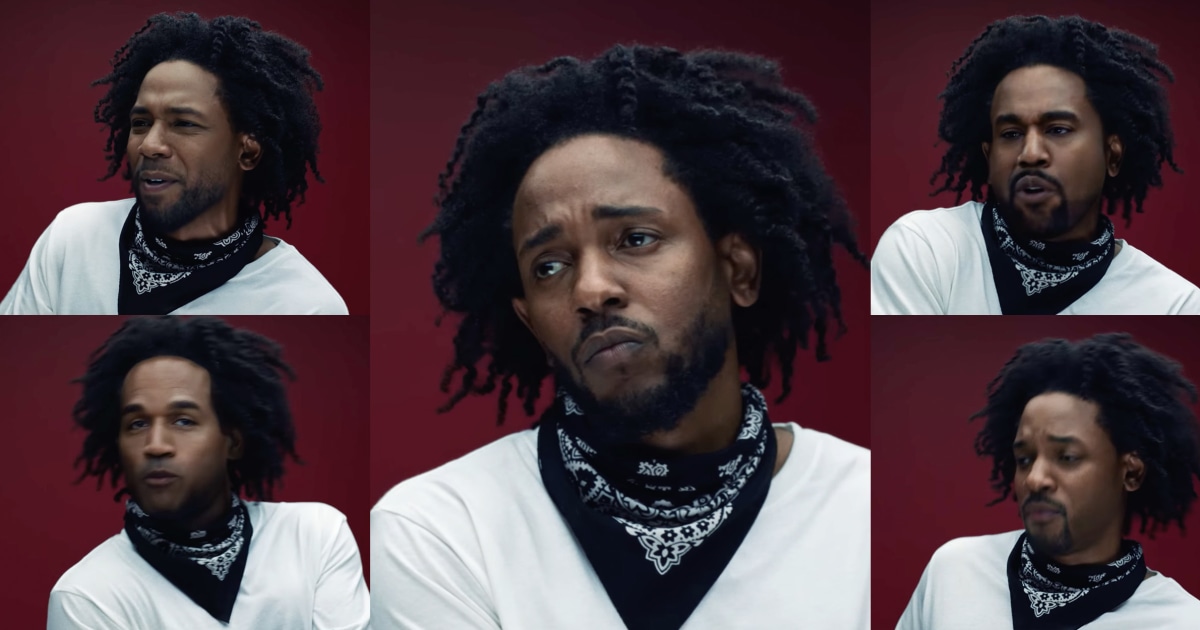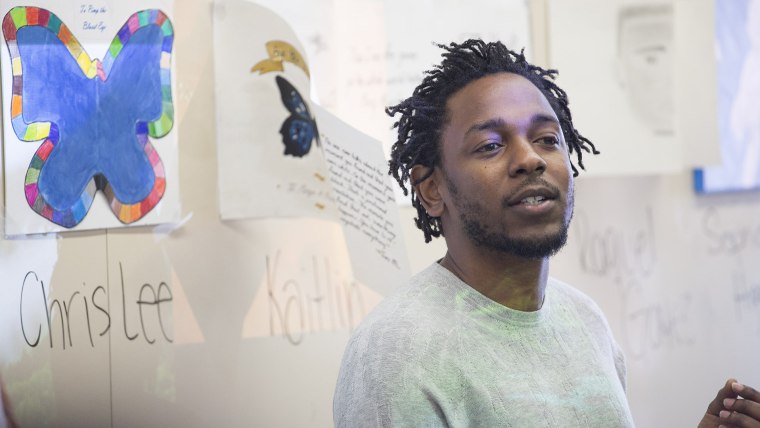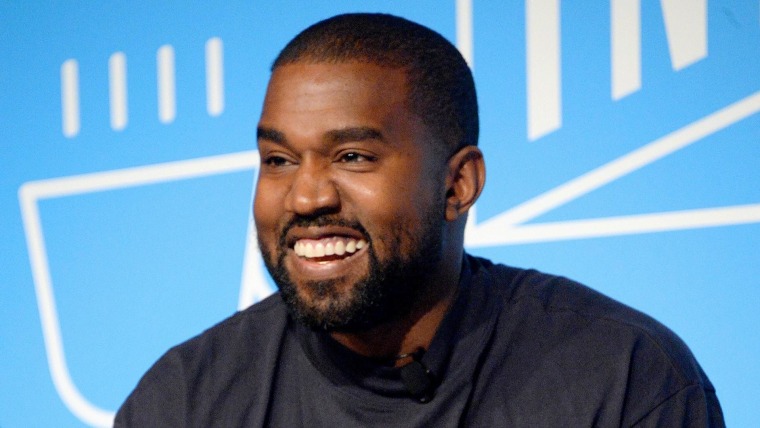At one point in the video for “The Heart Part 5,” the latest installment in Kendrick Lamar’s iconic “The Heart” series, Lamar raps over a Marvin Gaye sample while his face literally, surreally, morphs into that of Jussie Smollett’s.
In “The Heart Part 5” video, the hoax is more layered, more nuanced, more worthy of examination.
It has been more than three years since Smollett, the actor then co-starring on Fox’s “Empire,” claimed that two masked men ambushed him in Chicago at 2 am, poured an “unknown chemical substance” on him, and wrapped a rope around his neck. Since then, he’s evolved from a hero who fended off a racist and homophobic attack — he referred to himself as “the gay Tupac” during a subsequent concert — to a disgraced liar convicted for fabricating the entire order. In the time since Smollett’s scheme was uncovered, his promising career has been derailed seemingly beyond repair; he’s been incarcerated and released pending an appeal; and he’s become a running joke and internet meme.
But in “The Heart Part 5” video, the hoax is more layered, more nuanced, more worthy of examination. The image of Lamar’s face makes the transition into Smollett’s as he expertly raps, “The streets got me f— up/ Y’all could miss me/ I want to represent for us/ New revolution is up and moving.” Lamar as Smollett is designed to provoke thought, of course, as all the visuals throughout his career have, but this time he’s asking questions rather than providing answers.
“The Heart” series serves as an omen, almost like the toll that signals that The Undertaker is coming down the ramp at a WWE event. It means his next body of work from him is coming and he’s spent his musical hiatus (Lamar last released an album in 2017) observing hip-hop culture and preparing a sermon of sorts about where it stands. This time, he’s mediating about the complicated role Black men — or in the case of one of those he embodies, the man who killed him — serve in Black American communities and our broader culture.
Lamar mastered the art of the deepfake for this video, and he didn’t just embody Smollett. Over the course of the little more than five-minute clip, Lamar transforms into OJ Simpson (acquitted of murdering his former wife), Kanye West (who has spent the last few months harassing his ex-wife and her new partner), Will Smith (who slapped Chris Rock at the Oscars for disrespecting his wife), Kobe Bryant (charged with rape, though it was later dismissed), and Nipsey Hussle (Lamar’s close friend, whose 2019 murder shocked everyone, even beyond those who knew him intimately) .
Lamar’s lyrics speak to this inescapable conundrum, one that we’re grappling with every day as we learn how powerful human Black men really are.
In doing so, Lamar asks a simple question: Are they still a part of the culture? If so, what shall we do with them? Powerful Black men engage in morally questionable behavior all the time. Of course, there’s Bill Cosby and R. Kelly, who used their cultural cache to craft a shield of impenetrability, but that’s the extreme end of the spectrum. What about those living in harder-to-define grays that speak to larger systemic issues rather than a right-wrong binary?
Lamar’s lyrics speak to this inescapable conundrum, one that we’re grappling with every day as we learn how powerful human Black men really are. “Our foundation was trained to accept whatever follows/ Dehumanized, insensitive/ Scrutinize the way we live for you and I/ Enemies shook my hand, I can promise I’ll meet you/ In the land where no equal is your equal/ Never say I ain’t told ya, nah/ In the land where hurt people hurt more people/ F— callin’ it culture.” But if we don’t call it culture, what shall we call it?
Lamar could’ve chosen to transform into anyone, or even simply remain as himself, but he knows as well as any other artist the value in generating conversation that extends his art and gives it renewed, deeper meaning. He doesn’t operate as a shock jock who considers both negative and positive press to be rewarding. Instead, his work by him values the beauty of delving into complexity without a surefire pathway forward but a mandate to figure it out.
“The Heart Part 5” is a call to consider the reasons people harm rather than just focusing on the harm itself. It’s not a bid for absolute forgiveness, per se, but for a politic that considers the systemic reasons people step outside their character to do things that seem unimaginable. No one embodies that idea more than Hussle, a rapper, philanthropist, and entrepreneur who was gunned down by someone he knew in front of the store he created in his neighborhood as a pillar of hope for many who are hopeless. He was there that day, March 31, 2019, to give clothing to a friend who’d been recently released from prison — a prime example of his commitment to his community.
Lamar, who featured on Hussle’s first and only official studio album, “Victory Lap,” has been pretty silent publicly about his slain peer, but in this video, he not only embodies his face, but his movements, and uses this position to offer an olive branch of sorts to his accused killer, who will face trial soon. “And to the killer that sped up my demise/ I forgive you, just know your soul’s in question,” Lamar, as Hussle, raps. “I saw the pain in your pupil when that trigger had squeezed/ And though you did me thickly, I was surely relieved/ I completed my mission, wasn’t ready to leave/ But fulfilled my days, my Creator was pleased.”
If we can’t make space for the possibility that there’s more complexity than what’s on the surface, then what’s the use?
Who would take the life of a person so embedded in community uplift? Someone in pain without an outlet. Someone failed by every system designed to catch us, but that so often lets impoverished Black people fall. Someone in need of love, in need of stability, in need of solid mental health care, in need of resources. Lamar recognizes that those who are hurt feel compelled to hurt others, even if they’re unable to articulate their reasoning or if the only person they’re able to hurt is themselves. Why else would Will Smith jeopardize one of the pinnacles of his career — winning the Academy Award he’d been chasing for a decade — to slap his peer for making an untoward joke? Why else would Kanye West, who has openly said he has bipolar disorder though it’s unclear if he’s currently receiving treatment, spend months tracking his ex-wife’s every move and chronicling it on Instagram? Why else would Jussie Smollett fabricate an attack at the expense of his burgeoning career?
In our cultural imagination, these people are brutal. They’re irredeemable. They see violence as a way out of whatever conundrum they’re facing. Or, maybe, as Lamar seems to poke at, it isn’t that simple. We exist in a time that asks us as humans to prescribe to a culture of moral absolutism. Some of that has spawned from the emergence of a radical fascist movement masquerading as conservatism that has declared war on reproductive rights, trans rights and voting rights among others — which side are you on? — but some of it doesn’t serve us well.
If we can’t make space for the possibility that there’s more complexity than what’s on the surface, then what’s the use? As always, Lamar is showing his genius from him by asking those questions to us, holding up a mirror to our behavior, and asking us to dig deep into our brains and our hearts for answers, even when they’re impossible.


